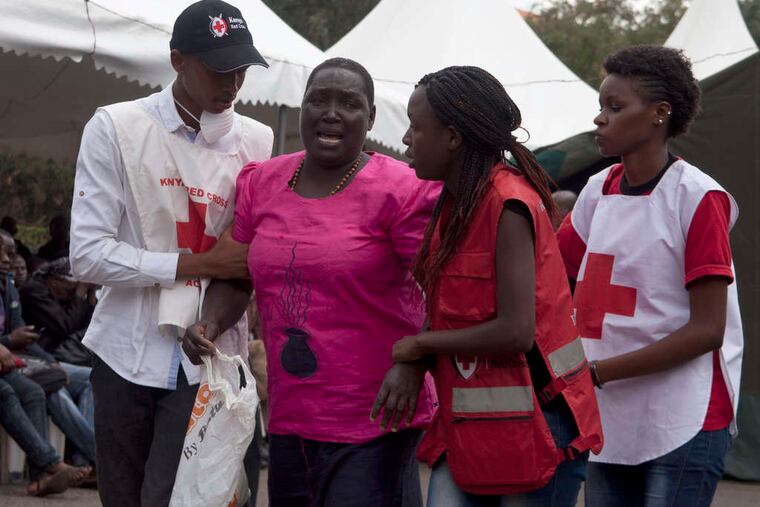
GARISSA, Kenya - Two days after al-Shabab militants slaughtered 148 people in a devastating attack on a university in northeastern Kenya, the Islamic extremists issued a chilling threat that its terrorizing of Kenya was far from over.
"Kenyan cities will run red with blood," al-Shabab said, according to the SITE intelligence monitoring group. "No amount of precaution or safety measures will be able to guarantee your safety, thwart another attack or prevent another bloodbath."
President Uhuru Kenyatta was defiant when he addressed the nation in response to the attacks and al-Shabab's statement. "We will fight terrorism to the end," he said. "I guarantee that my administration shall respond in the fiercest way possible." He declared three days of national mourning for the attack victims.
A Kenyan official said that five people suspected of involvement in the massacre have been arrested and that the government is pursuing other suspects, including Mohamed Mohamud. He is a former teacher at a Kenyan madrassa, or Islamic school, and the alleged mastermind of the attack.
"We will bring all of them to justice," Kenyatta said. "We are also in active pursuit of the mastermind and have placed a reward for his capture," he said of the $220,000 being offered for information leading to Mohamud's arrest.
Interior Ministry spokesman Mwenda Njoka said, in a Twitter post, that three people trying to cross into Somalia were arrested by Kenyan security forces. Two other suspects were arrested at the Garissa University College campus.
Thursday's assault was the worst terrorist attack in Kenya since the bombing of the U.S. Embassy in Nairobi in 1998, which killed 224 people. An attack on the Westgate shopping mall in Nairobi in September 2013 left 67 dead.
Saturday morning, a surviving Christian student was found at the university. She had been hiding in a wardrobe for two days since the attacks. Cynthia Cheroitich was taken to Garissa Hospital, where she told the Associated Press that she hid in the wardrobe, covering herself with clothing, when the attack started. She said she remained there as al-Shabab militants massacred her classmates.
She continued to hide as the militants were eventually killed by security forces and rescue workers evacuated surviving students. Even as volunteers began mopping the bloodied dormitories, she kept hiding. Cheroitich told the AP that when rescuers came, she thought they were militants and refused to emerge. It took one of her teachers to coax her out of her hiding place.
"I was just praying to my God," Cheroitich said.
The bodies of many of those killed in Garissa have been transported to the capital, Nairobi, and hundreds of surviving students were bused back to their homes Friday.
Life in Garissa is slowly beginning to return to normal, but citizens are reeling from the attacks.
"What has happened is sad; it's devastating," said Hassan Sheikh Ali, the first principal of Garissa University College. "All that we have been building, all the hopes we had, destroyed."
Many Garissa residents channeled their emotions by turning out in the traffic-clogged streets Saturday to view the bodies of four men alleged to have taken part in the assault, even as Somalian militants issued a statement threatening Kenya with more attacks.
Some wanted desperately to verify that the attackers weren't their countrymen, others wanted to see if they recognized a face, and still others wanted to see that those capable of such brutal acts had experienced some vague form of justice.
"I want to see them," Muna Haji said. "I want to know that these people are dead. They have killed innocent people."
The four naked bodies were loaded haphazardly into the back of a pickup truck at the morgue where they had been held since morning. Local and international forensics teams had taken their clothes as evidence.
The truck paraded the bodies through town as residents ran alongside, clamoring for a glimpse, until it arrived at Garissa Primary School, where about 2,000 people had gathered. There, it parked, and the bodies sat. Flies gathered on the bloated limbs hanging from the truck bed as the crowd swelled.
As it had with its previous assaults in Kenya, which have claimed the lives of more than 200 Kenyans in the last two years, al-Shabab said the attacks were in retaliation for Kenya's 2011 invasion of Somalia and its continued presence in the country. The invasion, called Operation Linda Nchi, was allegedly in response to the kidnapping of Westerners in northeastern Kenya.